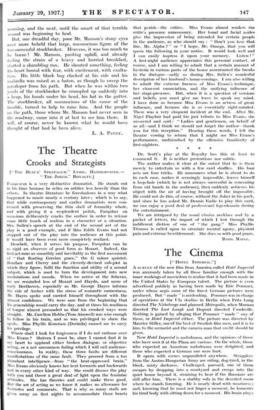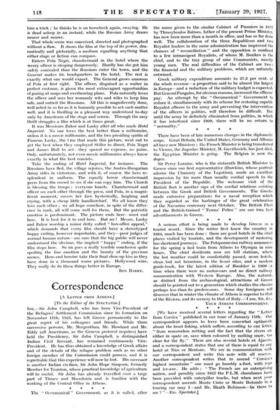The Cinema
[" HOTEL IMPERIAL.1
A SURVEY of the new film from America called Hotel Imperial was anxiously taken by all those familiar enough with the inner workings of moviedom to realize that it had been made in the United States by European talent. The picture is even advertised publicly as having been made by Eric Pommer, under whose aegis some of the finest German pictures were produced. But " made " is misleading. Pommer was in charge of operations at the Ufa studios in Berlin when Fritz Lang directed The Niebelungs and planned Metropolis, when Murnau directed The Last Laugh and Dupont directed Vaudeville. Nothing is gained by alleging that Pommer " made " any of those, or Hotel Imperial either. The picture was directed by Maurice Stiller, one of the hest of Swedish film men, and it is to him, to the scenarist and the camera-man that credit should be given.
Now Hotel Imperial is melodrama, and the opinions of those who have seen it at the Plaza are various. On the whole, those who expected an American melodrama were delighted, and those who expected a German one were hurt.
It opens with scenes unparalleled anywhere. Stragglers from the Austro-Hungarian Army are riding, dog-tired, in the bleak, misty darkness. Challenged, pursued, one of them escapes by dropping into a courtyard and creeps into the quiet house beyond it, straining to hear if the Russians arc still after him. There is a shabby sofa in the deserted room where he stands listening. He is nearly dead with weariness ; and, knowing that he must not linger a moment, he humours his tired body with sitting down for a moment. His brain plays him a trick ; he thinks he is on horseback again, swaying. - He is dead asleep in an instant, while the Russian Army draws nearer and nearer.
That whole scene was conceived, directed and photographed without a flaw. It shows the film at the top of its power, dra- matically and pictorially, a medium equalling anything that either stage or fiction can compass.
Enters Pola Negri, chambermaid in the hotel where the weary officer is sleeping dangerously. Hardly has she got him safely concealed than the Russians enter the town, and the General makes his headquarters in the hotel. The rest is exactly what one would expect. The General grows amorous of Pola at first sight. The officer, disguised as a waiter in perfect costume, is given the most extravagant opportunities of gazing at maps and overhearing plans. Pola naturally loves the officer and uses her womanly wits and wiles to keep him safe, and outwit the Russians. All this is magnificently done, well acted in so far as it is humanly possible to act such matter well, and it is thrilling in a pleasant way understood to-day only by Americans of the stage and screen. Through the easy thrill struggles a film which is at times great.
It was Messieurs Zukor and Lasky after all who made Hotel Imperial. No one loves the best better than a millionaire, unless it is a movie millionaire, and the two presiding spirits of Famous Lasky, the f rm that made this picture, went out to get the best when they employed Stiller to direct, Pola Negri and James Hall to act—they spared no expense, no pains. Only, unfortunately, not even movie millionaires always know exactly in what the best consists.
Take the ending of Hotel Imperial, for instance. The Russians have fled, the village rejoices, the Austro-Hungarian Army rides in victorious, and with it, of course, the hero re- splendent in uniform. The equally heroic chambermaid peers from the crowd to see if she can espy him. The Church is blessing the troops : everyone kneels. Chambermaid and officer see each other through the press, and Pola, in a magni- ficent moment, covers her face hysterically, laughing and crying, with a cheap little handkerchief. We all know they love each other ; we all hope somehow, in spite of the differ- ence in rank, all will come well for them. But the patriotic emotion is predominant. The picture ends here—must end here. It is best for it to end here. But no ! Messrs. Lasky and Zukor worship a minor deity called " box-office appeal," which demands that every film should have a stereotyped happy ending, however improbable, and they—poor judges of normal human nature--are sure that the big public will never understand the obvious, the implied " happy " ending, if the film stops here. So on goes a really terrible conclusion quite spoiling the fine emotion and the beauty of the previous scenes. Hero and heroine take their final close-up kiss as they have done in a thousand worse pictures. Hollywood wins. They really do do these things better in Europe.
IRIS BARRY.







































 Previous page
Previous page